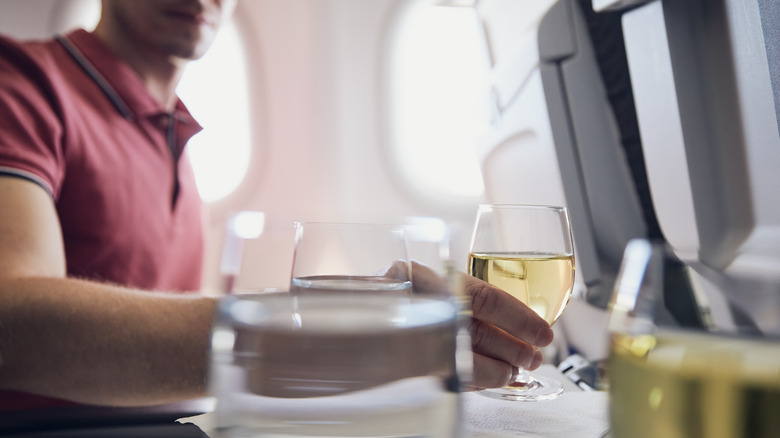Here's Why You're Extra Hungry After Long Flights, According To Science
Surviving a long-haul flight is hard for most travelers, and, unfortunately, it doesn't always get better once you land. You might continue to feel stiff, sleep-deprived, and out of sorts even after you arrive at your destination. Another ailment you might notice after your long journey: intense hunger.
If you've ever been ravenous on your way to baggage claim, you're not alone. Some travelers report feeling unusually hungry after a day of flying, even if they ate the provided in-flight meals and snacks. It turns out that there are some scientific explanations for this phenomenon. The first comes down to the effects of jet lag. Yep, jet lag, the condition that throws your sleep schedule into disorder, can also turn you into a total glutton. As Dr. Michael Breus, the author of "The Power of When," shared with Fox News, "Don't forget, our stomachs are on a circadian rhythm, so wherever our body used to be is where our stomachs once were." In other words, you might feel hungry because you're used to eating at certain times back home.
Jet lag and irregular sleep can also trigger hormonal changes in the body. Levels of ghrelin, known as the hunger hormone, tend to rise when you're short on sleep, which can up your appetite in response. Meanwhile, leptin, a hormone that suppresses hunger, dips following sleep deprivation. Additionally, if you find traveling to a new place stressful, you may also feel like you're starving thanks to cortisol kicking your appetite into overdrive.
You might be mistaking thirst for hunger
It's no secret that dehydration is among the bizarre effects air travel has on the human body. Plane cabins tend to be much drier than what we're used to on land because the air sourced at high altitudes lacks moisture. This can lead to dehydration if you don't guzzle H2O throughout your flight.
Confusingly, hunger and thirst signals can look and feel the same, and many people have a hard time telling them apart. In a 2008 study published in Physiology & Behavior, research participants responded to thirst and hunger in unpredictable ways 62% of the time. One such response was eating food but not drinking fluids despite being thirsty.
If you're routinely famished after flying, it could actually be your body's way of telling you to drink some water, especially if you didn't stay properly hydrated in the air. Sip some water after landing and then see if you still want food. And, to prevent this issue from occurring in the first place, keep a reusable bottle in your carry-on bag and ask the flight attendants for regular refills.
Giving in to your post-flight cravings isn't always a bad thing
It's often a mistake to sleep right after a long-haul flight, but the same can't always be said of eating. If you're hungry after arriving at the airport, a hearty meal can sometimes do you good — though it depends what time of day it is. If you book a red eye flight and arrive at your destination in the morning, try eating a big breakfast. Dr. Jamie Zeitzer, a sleep expert at Stanford University, told Everyday Health, "By eating a large breakfast early in the morning, you're helping to reset your gut clock. These peripheral oscillators (the circadian rhythms in the cells found through the body) can often shift faster than the central one in the brain, and that helps shorten the period when you might experience jet lag."
If you're dehydrated, certain foods can also help replenish fluids in your body. These include fruits, vegetables, soups, and some dairy products, such as yogurt and cottage cheese. Just be sure to drink water, too, to maximize hydration.
Beware that some foods and drinks should be avoided after touching down. One example: coffee. If you're struggling to adapt to a new time zone, the caffeine in coffee could exacerbate the problem, given that it can affect levels of melatonin (the hormone that regulates your sleep cycle) in the body. Alcohol can also be a bad idea, especially if you're already dehydrated, as it acts as a diuretic and depletes your body of fluids.


